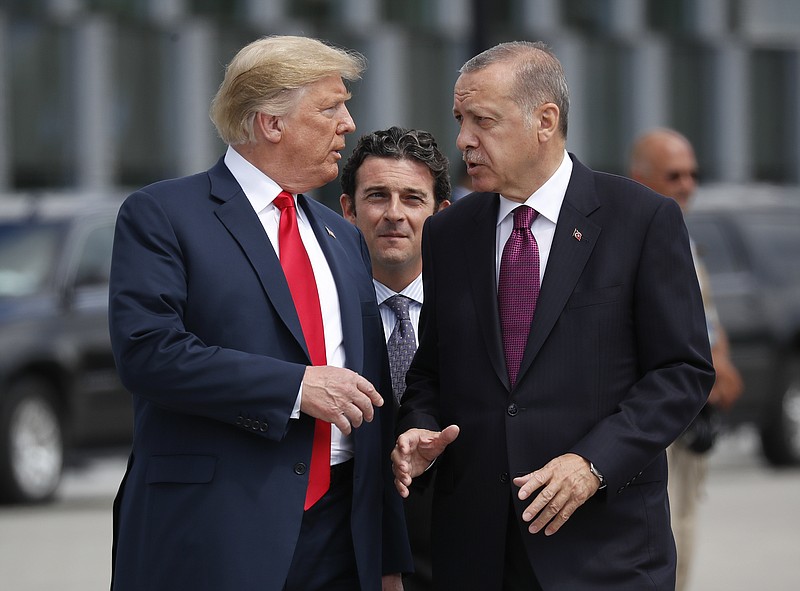WASHINGTON (AP) — Facing wide criticism, President Donald Trump sent out conflicting signals on the “endless war” in Syria and the Middle East on Monday. He declared U.S. troops would step aside for an expected Turkish attack on Kurds who have fought alongside Americans for years but then threatened to destroy the Turks’ economy if they went too far.
Even Trump’s staunchest Republican allies expressed outrage at the prospect of abandoning Syrian Kurds who had fought the Islamic State group with U.S. troops. Trump’s decision appeared to be the latest example of an approach to foreign policy that critics condemn as impulsive.
“A catastrophic mistake,” said Rep. Liz Cheney, of Wyoming, the No. 3 House Republican leader.
“Shot in the arm to the bad guys,” said Sen. Lindsey Graham, of South Carolina.
Pentagon and State Department officials held out the possibility of persuading Turkey to abandon its expected invasion.
In recent weeks, the U.S. and Turkey had reached an apparent accommodation of Turkish concerns about the presence of Kurdish fighters, seen in Turkey as a threat. American and Turkish soldiers had been conducting joint patrols in a zone along the border. As part of that work, barriers designed to defend the Kurds were dismantled amid assurances that Turkey would not invade.
Graham said Turkey’s NATO membership should be suspended if it attacks into northeastern Turkey, potentially annihilating Kurdish fighters who acted as a U.S. proxy army in a five-year fight to eliminate the Islamic State’s so-called caliphate. Graham, who had talked Trump out of a withdrawal from Syria last December, said letting Turkey invade would be a mistake of historic proportion.
“It’s going to lead to ISIS reemergence,” he told Fox News.
U.S. involvement in Syria has been fraught with peril since it started in 2014 with the insertion of small numbers of special operations forces to recruit, train, arm and advise local fighters to combat the Islamic State. Trump entered the White House in 2017 intent on getting out of Syria, and even before the counter-IS military campaign reclaimed the last militant strongholds early this year, he declared victory and said troops would leave.
The strong pushback on Capitol Hill to the late Sunday night announcement prompted Trump to recast his decision but with renewed bombast, portraying it as a threat to strangle Turkey if it carries out its announced intent to invade.
“As I have stated strongly before, and just to reiterate, if Turkey does anything that I, in my great and unmatched wisdom, consider to be off limits, I will totally destroy and obliterate the Economy of Turkey,” he tweeted.
Officials suggested Trump’s threats against Turkey on Monday morning were reactions to the criticism of his earlier announcement that the U.S. would withdraw troops and get them out of the way of the Turkish forces. That announcement came after Trump spoke by phone with Turkish President Recep Tayyip Erdogan.
One official described a botched effort by the White House on Sunday night, putting out a statement that appeared aimed at making Trump look bold for ending a war. The official said attempts by the Pentagon and State Department to make the statement stronger in its opposition to Turkey’s military action were unsuccessful. However, in what the official described as an “exercise in damage control” Monday morning, the Pentagon made it clear to the Turkish military that “there will be a major break in relations if you do this.”
The official added Erdogan appeared to be reconsidering his earlier resolve because he was relatively quiet Monday. However, the official cautioned even if pressure from the U.S. and Europe succeeds in getting Erdogan to back down, the damage done to relations with the Kurds may be irreparable.
An official familiar with the Erdogan call said the Turkish president was “ranting” at Trump, saying the safe zone was not working and Turkey couldn’t trust the U.S. military to do what was needed. And in reaction, Trump said the U.S. wanted no part of an invasion and would withdraw troops.
The announcement threw the military situation in Syria into fresh chaos and injected uncertainty into U.S. relations with European allies. A French official, speaking on condition of anonymity on a sensitive topic, said France wasn’t informed ahead of time. A Foreign Ministry statement warned Turkey to avoid any action that would harm the international coalition against the Islamic State and noted the Kurds had been essential allies, but it entirely omitted any mention of the United States.
Hours after the White House announcement, two senior State Department officials minimized the effects of the U.S. action, telling reporters that Turkey may not go through with a large-scale invasion, and the U.S. was still trying to discourage it. Both officials spoke only on condition of anonymity to discuss what led to the internal White House decision.

